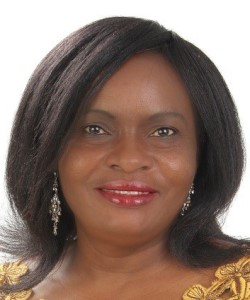
 |
Name | Esther Kibuka-Sebitosi |
| Highest qualification | PhD (Ahmadu Bello University, Nigeria) and MBA (Open University, UK/UNISA) | |
| Position | Director: Corporate Services and Full Professor Sustainable Livelihoods and Resource Management | |
| Contact details | sebitek@unisa.ac.za | |
| Research interests/expertise | Sustainability Livelihoods; Climate change; Biodiversity; Economies, Sustainability and Governance (ESG), Education for Sustainable Development (ESD), Resource Management and Multi-Inter and Trans-disciplinary approaches in research. | |
| Teaching | Full Professor Sustainable Livelihoods and Resource Management | |
| Current projects | Education for sustainable Development: Sustainable Livelihoods and Models for Sustainable businesses, Development of ESD courses, Strategy and management, Exploring visual cultures, Policy analysis for sustainable businesses, Zoology and Biodiversity for sustainable change and Transition to green economies |
Prof Kibuka has over 20 years of experience and competencies in management and research leadership gained locally and abroad. She has, for example, been at the Institute for African Renaissance studies since 2003. She is currently the Head of Corporate services at the Thabo Mbeki African School of Public and International Affairs, which she helped to establish in 2020.
Prof Kibuka has a PhD in Biological Sciences, specialising in vector-borne diseases, an MBA from Open University UK/UNISA, an MSc in Human and Veterinary Entomology and Parasitology from the University of Nairobi, Kenya and BSc (Hon) Zoology and Botany from Makerere University, Uganda. With this broad background, she is well capable of leading complex knowledge production, teaching and research within the complex African environment. Given the digital era and the COVID-19 pandemic, Prof Kibuka is well-equipped with a Graduate Certificate in Technology in Distance Education and e-Learning from the University of Maryland University College (UMUC) and is currently finalising a Master's in Education MEd (ODL). Having lived, studied and worked in East, West and Southern Africa and abroad, Prof Kibuka's knowledge of the African continent makes her an asset to many teams.
She has conducted research on health systems and diseases such as Trypanosomiasis, Theileriosis and Malaria and was a trustee and board member for the Health Systems Trust, South Africa. She has experience in science education as she developed training materials for science teacher education and HIV prevention. Her knowledge of gender and politics is wellillustrated under the gender and elections lecturers she supervises under the Management of Democratic Elections (MDEA) programme. She established several community engagement projects and is a distinguished scholar and leader in sustainability, for instance, Education for Sustainable Development (ESD) in Africa and globally. She is a member of the ESD expert Net (www.ESD-Expert.net), an international initiative on ESD with Germany, India, Mexico and local partners in South Africa, where she serves as a mentor. Prof Kibuka has developed partnerships locally and internationally, for instance, with the Academy of Fine Arts, Munich, on the project, “Exploring visual cultures” (https://www.explore-vc.org/en/objects/examples/south-africa/twocities-two-economies.html), where she researches the paradoxes and contradictions of modern-day livelihoods and decoloniality, using images for education in a virtual platform.
Prof Kibuka-Sebitosi has management expertise in higher education and served ODeL UNISA comprehensive University as leader of the Institute for African Renaissance studies before she joined the Thabo Mbeki African School of Public and International Affairs. Prof Kibuka-Sebitosi spearheaded the strategy formulation and implementation of the new TM School, heads.
Corporate Services and is a Full Professor of the Sustainable Livelihoods and Resource Management academic pillar. Prof Kibuka-Sebitosi has supervised many students (10 doctoral and 2 master's) to successful completion and currently supervises 20 master's and doctoral students utilising the multi-inter and transdisciplinary approaches. Prof Kibuka -Sebitosi has mentored her colleagues and others in several fields including over 50 mentees in Education for Sustainable Development, covering themes such as climate change, sustainability and clean energy in the political, environmental, social and economic dimensions of sustainable development. Prof Kibuka-Sebitosi serves as a member of several associations and a board member locally and internationally. She served on the Board of Directors of the European Union Training foundation, Torino Italy, member of the eHealth Leadership Development and member of the European Union Space Agency of eHealth Regulation Environment in sub-Saharan Africa, with Green Fields, was the National Coordinator for Education for Sustainable Development Expert Net, South Africa, Member of Gauteng Environmental Education Forum, Founder of the Gauteng Regional Centre of Expertise (GP-RCE) and is a mentor in the ESD Expert Network: Education for Sustainable Development (ESD), Bonn, Germany – a joint project between South Africa, India, Mexico and Germany (www.esd-expert.net).